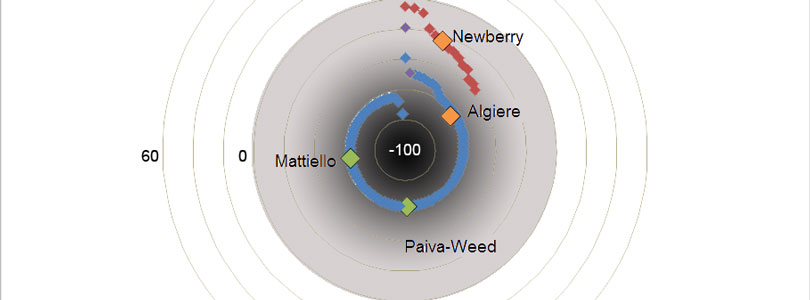The Freedom Index and the Continual Sinking of Rhode Island
With the start of the legislative session, the RI Center for Freedom & Prosperity has released its Freedom Index report for the 2015 session, and as usual, the results are discouraging. Also as usual, I find the most telling chart to be the one that places individual legislators in a downward spiral:
Notably, not a single legislator of any party landed in the positive range, which means that in the Center’s assessment no legislator managed to vote the correct way often enough to make up for all of the times he or she voted the wrong way.
Naturally, this raises questions about our methodology — whether we’re too rigid or too extremist or too something. Value judgments are for each person to make, individually, but we don’t set out to draw an extremist line. Rather, the goal is to judge bills and quantify their likely effect on Rhode Islanders’ (you guessed it) freedom and prosperity.
I’m primarily responsible for reading the bills, writing brief descriptions of them, and compiling a broad list of which ones we should track, but a panel of reviewers goes through the list, and bills’ scores often go up and down based on that feedback, periodically being removed based on the shared assessment that they really aren’t consequential. From there, it’s just a matter of counting votes.
When other (non-politician) people have gotten a look behind the curtain, they’ve sometimes expressed surprise that they agree with (first) the bill descriptions and (next) the scores that the bills receive. If there’s anything radical, in other words, it’s the simple act of thinking about each bill.
That’s the only reason I can come up with, anyway, that the General Assembly would be home to such universally bad voting. People with whom I would expect to agree on just about everything vote in ways that I find inexplicable. I wonder, therefore, whether the problem isn’t so much one of political philosophy as of civic understanding.
The role of representatives and senators isn’t (or shouldn’t be) to act as quality assurance on an assembly line of legislative widgets, determining whether each one meets muster to pass into law. That’s much too passive. Every new law is something that the government is doing to somebody. The standard shouldn’t be: “Is it reasonable for somebody to ask government to do this to people.” It should be: “Does government have to do this to people.”
In that process, legislators who vote for a bill (or fail to vote against it) are just as responsible for the effects as the sponsor who introduced it, the lobbyist who was paid to promote it, and the special interest who will benefit from it. It is not acceptable for legislators to wave the widgets on through simply because they don’t have the expertise to know whether they will do any harm. The people promoting new legislation should have the burden of affirmatively proving to each and every legislator that the thing must be done.



